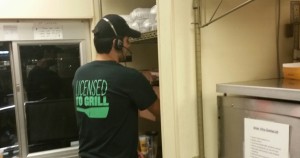For most high school students, the only important “job” is making good grades– only 22.3% of high school students worked in 2014. Considering it’s only practical for juniors and seniors (who can drive) to work, that statistic would probably be less than half for those groups. Only a few, enticed by the fruits of labor, take a crack at the “real world” before they’re even allowed to vote. Working is a learning experience, and one which teaches many valuable lessons. Many people underestimate the impact of the real-life lessons learned through work, ones that will stay with a high school student through their adult life.
Having a job will teach anyone to understand other people. When we’re young and immature, we consider our parents oppressive towards us. Working helps one mature and come to understand that their boss is just like them– they’ve just been there longer. They’re not an oppressive dictator who delights in the misery of their employees. Often they’re not even that bright– someone just figured they were a good replacement for the last boss, whenever they quit. Naturally, some bosses see it fit to hand out busywork to idle employees. But a good boss worries about “real work.” If employees are just standing around, it’s usually bad news for the people who run the place. After all, the goal for the business is to make money faster than its owners can spend it. When a boss starts telling people to do odd things, like cleaning windows, it’s easy to feel like they hate their employees– but they’re just trying to not get fired themselves.
Working is also an excellent experience in learning about the kind of people which comprise “The Public.” Ask anyone who has a part-time job for stories about customers they’ve had the pleasure of meeting– they’ll be happy to oblige. The vast majority of the time, selling something to a customer is a formal, one-time interaction where the employee reads from a mental script, figures out what they want, and keeps it polite. Pleasant or overly friendly customers are an oddity and can be off-putting. Some people, one will learn, are ready to be hostile, suspicious, and confrontational over hamburgers and fries. Anyone who does this for long enough will earn a healthy skepticism for people they meet, and that doesn’t just apply to customers. Like bosses and customers, co-workers are only human. They have flaws, ambitions, and beliefs people can’t anticipate. They will also hold differing moral and ethical codes. Employees that don’t do their jobs make everyone else’s jobs harder– but they can keep it up for some time. In any part-time job, a high school student can learn to effectively deal with people and work cooperatively with them.
Maybe the most important lesson one will take away from holding down a job is how pleasant the accomplishment can be. When we’re young, we rejoice in dodging responsibility and avoiding work. Going from having many free afternoons to do what one pleases to working a job is something many people dislike the idea of. However, any business that would conceivably hire a high schooler won’t make demands too outrageous of them. As students, we’re constantly pressed to take on bigger and bigger challenges, and our lives only get harder as we advance into higher classes and extracurriculars. Working a repetitive, monotonous job that never actually gets any harder can become something relaxing in a student’s life- something one can accomplish without stress or worrying excessively about it.
Students who go through high school without taking the leap to work real jobs rob themselves of a great learning and growing opportunity. Many people who leave high school are shocked to learn how little the educational environment mirrors the “real world”. Working through high school gives students the perfect taste of the harsh realities that they’ll eventually face after they’re done with classrooms, teachers, and tests.
Working is an indispensable experience that better prepares the adults of tomorrow for the rest of their lives.

Leave a Reply